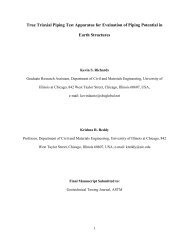Toward a Useful Theory of Mentoring: A Conceptual Analysis and ...
Toward a Useful Theory of Mentoring: A Conceptual Analysis and ...
Toward a Useful Theory of Mentoring: A Conceptual Analysis and ...
You also want an ePaper? Increase the reach of your titles
YUMPU automatically turns print PDFs into web optimized ePapers that Google loves.
causal explanation. In the rush to consider such obviously important issues as the nature<br />
<strong>of</strong> effective mentoring, the benefits <strong>of</strong> mentoring, <strong>and</strong> the impacts <strong>of</strong> mentoring on<br />
women <strong>and</strong> minority careers, there is all too <strong>of</strong>ten impatience with troublesome<br />
conceptual <strong>and</strong> analytical problems.<br />
Our paper reviews <strong>and</strong> criticizes mentoring theory, focusing particularly on<br />
conceptual bases <strong>of</strong> theoretical problems. We seek to demonstrate that despite the<br />
publications <strong>of</strong> hundreds <strong>of</strong> studies <strong>of</strong> mentoring, many <strong>of</strong> the findings are less useful<br />
than one might hope because fundamental conceptual <strong>and</strong> theoretical issues have been<br />
skirted. Findings are abundant but explanations are not. The device used to demonstrate<br />
this point is a simple thought experiment <strong>of</strong> a putative mentoring relationship. The<br />
thought experiment demonstrates the difficulty <strong>of</strong> using existing research <strong>and</strong> theory to<br />
answer fundamental questions about mentoring.<br />
A MORE USEFUL THEORY OF MENTORING: WHAT IS MISSING?<br />
From one perspective, mentoring theory could hardly be more useful. Many<br />
researchers focus explicitly on the ways in which individual careers can benefit from<br />
mentoring (Allen, Eby, Poteet, Lentz, Lima, 2004; Godsalk & Sosik, 2003; Dirsmith &<br />
Covaleski, 1985; Fagenson, 1989; Noe, 1988), including women (Burke & McKeen,<br />
1996, 1997; Ragins, 1989; Ragins & Sundstrom, 1989; Sc<strong>and</strong>ura & Ragins, 1993) <strong>and</strong><br />
minorities (Ragins, 1997a; 1997b; Thomas, 1989). Others focus on the organization <strong>and</strong><br />
develop ideas or findings aimed at improving organizational performance (Payne &<br />
Huffman, 2005; Singh, Bains, & Vinnicombe, 2002; Wilson & Elman, 1990). Thus,<br />
mentoring research <strong>and</strong> theory are useful in the sense that they aim to provide practical<br />
findings relevant to individual <strong>and</strong> social needs.<br />
4



